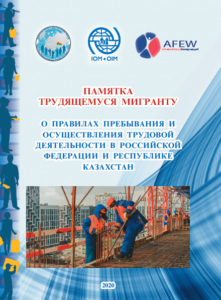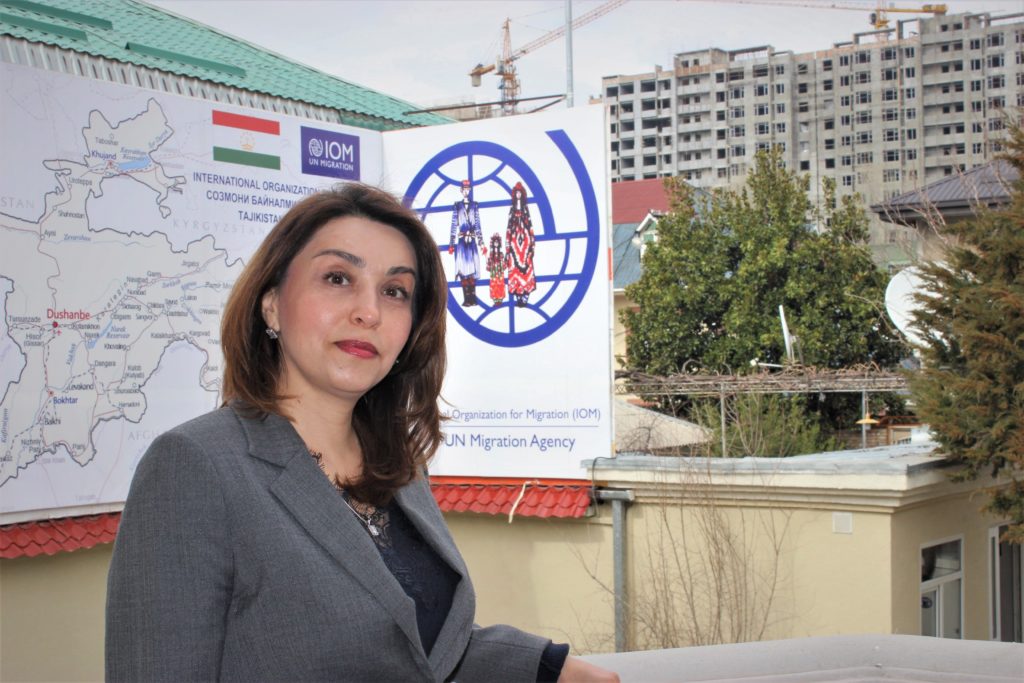Tajikistan is a country marked by a high level of labour migration due to a lack of work in the country. According to official figures, in 2019 more than 500.000 Tajiks left the country for working abroad. The majority works in Russia, where there is a high prevalence of HIV. The proportion of the Tajik migrants among new registered HIV cases in Tajikistan increased from 10.1 percent in 2014 to 18.8 percent in 2018. Also, little is known about migration of key populations, such as people who use drugs and men who have sex with men (MSM), and their behavior in using health services while working abroad.
To enhance Tajik migrants’ access to HIV services, particularly key populations, IOM Tajikistan together with AFEW International and AFEW Kyrgyzstan launched the project “Improving migrants’ access to HIV services in Tajikistan” in 2019.
What are the goals of this project and how will it change migrants’ lives? Rukhshona Kurbonova, National Professional Officer, Sub-Regional Coordinator on Migration Health for Central Asian countries, talked to AFEW International.
Rukhshona, why it is important to work with migrants?
Migrant workers significantly contribute to the economy of the countries of origin and countries of destination, but are often left out when it comes to health programming. The majority of the Tajik migrants is involved in low skilled jobs, even if they have a good education. The prerequisite for good performance – even for low skilled work – is good health; therefore, both countries of origin and destination benefit from healthy migrants. However, migrants can be stressed by facing a new environment, culture, language, and they are often exposed to poor working and living conditions in the receiving country. This all can put their health at risk. This all circumstances put their health at risk and make migrants vulnerable.
Additionally, since the majority of Tajik migrants are young men from rural areas, where strong social control is part of the traditional patriarchal society, getting into a big metropolis with different norms and morals can impact their sexual behaviour. A difference in social control, little knowledge about prevention of sexually transmitted infections and HIV, alcohol consumption and drug use, and casual sex all play into migrants’ vulnerability to Sexual Transmitted Infections (STIs) and HIV. Therefore, it is important to address their health needs and raise awareness. Integrating migrants into national health programmes and strategies is part of the agenda of the Universal Health Coverage approach promoted by the WHO and other UN organizations including IOM.
 The project “Improving migrants’ access to HIV services in Tajikistan” aims to enhance Tajik migrants’ access to HIV services, particularly among key populations. How do you plan to reach this goal and which tools will you use?
The project “Improving migrants’ access to HIV services in Tajikistan” aims to enhance Tajik migrants’ access to HIV services, particularly among key populations. How do you plan to reach this goal and which tools will you use?
The project is composed of two parts: The first part is working in the field with returned migrants in Kulob to raise awareness on safe migration and promoting health seeking behaviour relating STIs and HIV through peer networks. The second part is a regional working meeting with the participation of officials and HIV service NGOs from the Russian Federation, Kazakhstan, Kyrgyzstan and Tajikistan to discuss the essential HIV related package of services for migrants from Central Asia, as recommended by the World Health Organisation.
For the fieldwork in Kulob, IOM will partner with the local NGO “Nakukor”, which has strong experience in working with different groups of migrants. Jointly, they will promote the peer-to-peer approach and hire outreach workers among representatives from the key populations. In addition, within this project supported by AFEW International, IOM will provide free access to HIV tests and survey key populations among migrants to map their sexual behavior and refer them to HIV testing when needed. A legal consultant and venereologists will conduct information sessions for migrants on safe migration and prevention of STIs and HIV. Thanks to the project, two new brochures on safe migration and prevention of STIs and HIV will be developed for migrants. To ensure the sustainability of the project, IOM implements all activities jointly with relevant governments stakeholders – the Tajik Ministry of Labour, Migration and Employment, the Republican Healthy Lifestyle Promotion Center and the Republican AIDS Control Center of the Tajik Ministry of Health and Social Protection.
How long does IOM Tajikistan work with migrants?
IOM Tajikistan has been working on migrants’ health since 2005 and implemented projects on the prevention of STIs, HIV and TB among outbound and inbound migrants. The activities of the Migration Health Unit at IOM Tajikistan are covering the four main pillars needed to ensure the health of migrants holistically: monitoring migrants’ health, advocacy for policy development, provision of migrant sensitive health care services and strengthening inter-country coordination, partnership and networking. IOM Tajikistan has been implementing innovative approaches to reach migrants through peer education, engagement of the diaspora, the creation of multidisciplinary teams in the districts, the publication of communication materials in different languages such as Tajik, Russian, Uzbek, Chinese, Dari, Turkish, and others and by ensuring a multisectoral approach and cross border cooperation. To improve knowledge and skills of the stakeholdres, NGOs and health workers on promoting migrants’ health, a number of educational materials, such as manuals, video clips, and documentaries, were developed and distributed. Additionally, IOM Tajikistan is experienced in providing technical support and promotes the inclusion of migrants’ health issues and concerns into health-related policy documents, such as those developed by the HIV and TB National programmes. Last but not least, we are currently contributing to the development of the National Health Strategy for 2021-2030 and the National Strategy on migration health. IOM Tajikikstan is a member of the Technical Working Group on developing new National AIDS Control Programme and National TB Control Programme for 2021-2025.
Which barriers you might face in Tajikistan and how you are going to overcome them?
Stigma and discrimination are the main barriers faced by migrants and the general population in Tajikistan in accessing HIV services. There is also a high stigma of people who are using drugs, and sexuality is also a taboo topic in society. With our peer-to-peer-approach, we want to reach out to key populations. Through the awareness-raising campaign, working with migration officials and health workers, we want to address and reduce stigma and discrimination of people living with HIV and of key populations. For a better understanding of migrants’ access to HIV services in Tajikistan, the project also has as an operational research component to explore the barriers face by migrants when coming back home.
What do you expect from the project?
The results of the project will improve our understanding of the migrants’ needs concerning HIV services. The project will also help in developing effective communication and health promotion strategies that improve the detection of HIV among the migrant population and refer them for adequate treatment.
 Helena Arntz, Junior project officer of AFEW International
Helena Arntz, Junior project officer of AFEW International
Public opinions about migrants, in particular key populations among migrants, are often full of prejudice and stereotyping, which leads to discrimination in the health care system. Migrant workers are in constant movement and often a long time from home, so they can have more difficulties in getting the health care they need. They receive little information about how to be safe abroad, which poses continuous threats to their health and that of their families.
AFEW International has experience with and knowledge on migration in Central Asia and Russia. AFEW International currently also manages two projects in Russian cities Rostov-on-Don and Yekaterinburg to improve healthcare for migrants living with HIV.
In this joint project with IOM Tajikistan we not only want to address the limited information available to key populations among migrants, but also gain better insight in the behavior of this specific group. As the consequences of unsafe migration are not limited to the home country, we will address the needs of migrants at a regional event in Dushanbe. We expect that this will increase cross-border cooperation between Central Asian countries and Russia to improve the needs of key populations among migrants.




